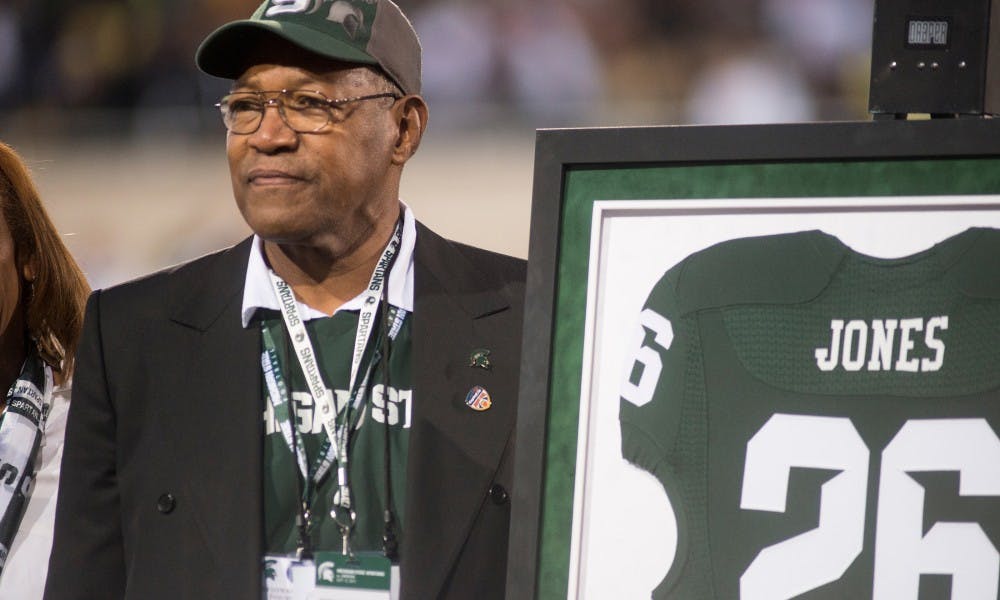You could hear the excitement in his voice when former MSU running back Clinton Jones talked about his return to East Lansing.
Jones, a two-time All-American, was honored and put into the Spartan Stadium Ring of Fame before MSU’s 31-28 win over Oregon on September 12, eight months after he was named to the College Football Hall of Fame.
Jones was able to bring his children and grandchildren with him to witness his moment in front of nearly 80,000 fans at Spartan Stadium.
“It was an unexpected honor, but it was well-deserved,” Jones said. “I appreciate that, and it is an honor. It’s a lifetime accomplishment.”
Jones was extremely humbled by the opportunity, but it was bringing his family with him for the moment that really makes it special.
On coming to MSU
At MSU, Jones accumulated 2,549 career all-purpose yards and 23 touchdowns in three years as a letterman from 1964-66.
In 1965 and ‘66 Jones was part of a Spartan team that went 19-1-1 throughout two years, capturing back-to-back Big Ten and National Championships.
“Clinton Jones, 19-1-1 in his time here (in 1965 and 1966). Second pick overall in the (1967) NFL Draft, National Championships (1965-66), Big Ten Championships (1965-66),” head coach Mark Dantonio said during a press conference. “So, we’re very, very excited about him being inducted into the College Hall of Fame and also having his name put up in our Ring of Fame in the stadium. So this will be a special time for him.”
Before his wildly successful collegiate career, Jones was just an under recruited kid from Cleveland, Ohio.
“I wasn’t really highly recruited, because I didn’t really have an outstanding football career in high school,” Jones said. “I only had two touchdowns. There weren’t a lot of schools that were aggressively pursuing me — as a matter of fact there were very few.”
Jones had initially planned on going to Nebraska, then had a plan to go to Detroit-Mercy.
It wasn’t until his track coach convinced him to look at MSU that Jones gained an interest in the Spartans.
Overcoming Segregation
Jones came to MSU as a freshman in 1963, a very different time for the average black student.
MSU’s 1966 team had 20 black players on it, which may not sound like much today, but as a point of comparison Southern California’s 1967 National Championship team only had seven black players.
Alabama didn’t dress its first black player in a varsity game until 1971, and LSU and Georgia didn’t field their first black players in a varsity game until 1972, as previously reported by The State News.
Former MSU head coach Duffy Daugherty (1954-72) was a pioneer in the racial integration of college football. Jones and his teammates were more than just great football players on championship teams — they made history.
“I feel that Duffy Daugherty hasn’t been given the accolades that he deserves,” Jones said. “He accomplished more than just being a coach, he was a humanitarian and he was a very profound human being. My question is why he hasn’t been given more accolades in terms of what he’s done especially opening up and creating (a place for everyone).”
Jones was incredibly grateful to Daugherty for giving him an opportunity, and you could see the love that Jones had for his late head coach.
“Duffy was a very warm individual, I love Duffy, he was a great mentor we had a very warm relationship,” Jones said. “I would die for him, I would die for my teammates. That’s the way I felt — when I went out there I was willing to put my life on the line to win.”
For Jones, winning was everything in his time at MSU, in what was the most successful period for Spartan football.
“I wasn’t trying to stack up statistics,” Jones said. “What was most important to me at the end of the game is that we won... When I played I left everything on the field.”
But it wasn’t easy, there were always players who wanted to give up and go home Jones said and getting adjusted to living on a college campus and in East Lansing took time.
“Coming out of Cleveland, I just loved the university atmosphere,” Jones said. “But it was really an adjustment. It took a year and a half to really adjust.
“We encouraged each other. Every week somebody wanted to go home, but because we lived together in the dormitories we were able to discuss what we were going through we could have camaraderie and we ate together.”
Even though his recent induction was an honor for his own accomplishments, Jones saw this as a stage to thank his coaches, teammates and everyone that helped support him.
It is that attitude that helped the players stick together in the '60s and it’s what keeps Jones and his remaining teammates so close.
Giving back
Jones made his history on the football field, but now his life’s mission is to be a resource to the youth.
With racial tensions seeming to dominate the headlines these days, Jones made it clear that athletes have a responsibility to be involved.
“Because we’re playing sports doesn’t mean we can put our heads in the sand and be divorced from what’s going on,” Jones said. “50 years ago what was going on we didn’t let that destroy our mission for what we were doing as student athletes.”
Through the years, Jones has done countless interviews and he felt nostalgic giving another, recalling a time 50 years ago when he was an athlete.
He said he tries to put all of his effort into helping the youth, and gladly shares his thoughts and insights with anyone that seeks it.
“My wife and I, we’re devoted to young people,” Jones said. “We’re devoted to making this a better country and a better world.”



